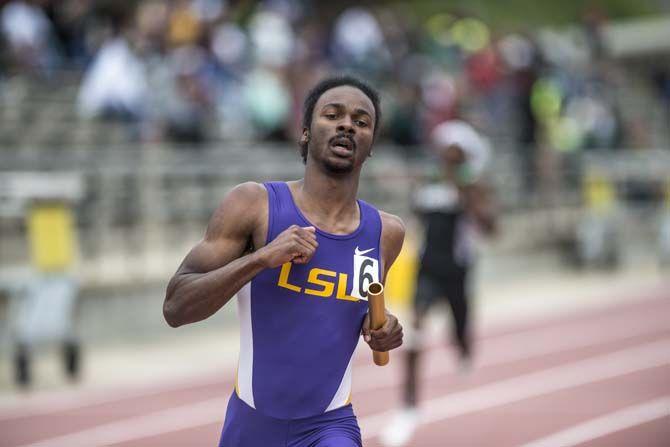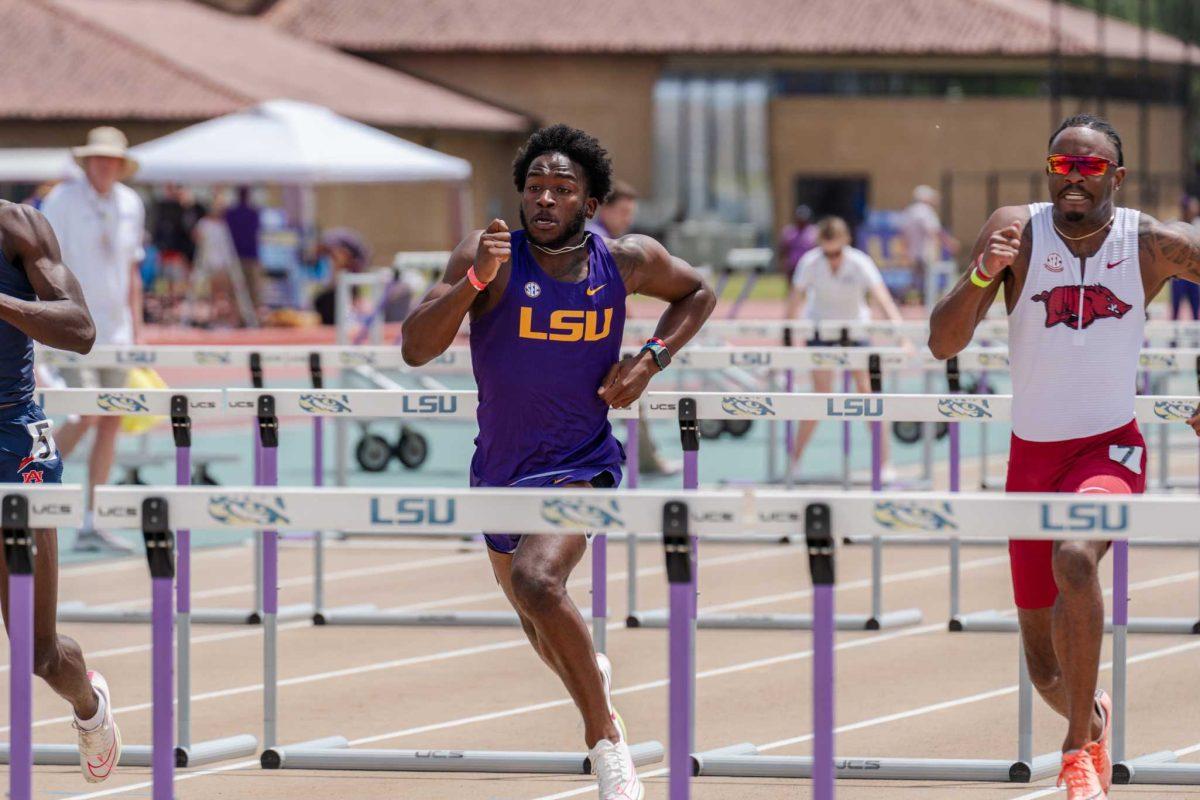On Aug. 29, 2005, Aaron Ernest sat in an overcrowded car with seven relatives for more than 12 hours, uncertain of his future or the fate of his home asit was about to be ravaged by Hurricane Katrina.
Ten years later he has emerged as a Junior National Champion, an NCAA champion and one of the most accomplished sprinters in LSU track and field history.
Ernest grew up in the Lower Ninth Ward in New Orleans, a neighborhood infamous for its street violence. Ernest’s father was killed when the future Tiger was only two months old, leaving only his mother to support five children and forcing Ernest and his siblings to work at an early age.
“It was tough growing up,” Ernest said. “I remember a lot of being kicked out of houses and lights being turned off and stuff like that for months at a time and for summers at a time.”
Ernest said all the adversity he faced growing up helped him in the long run.
“It was rough, but looking back on it, it made me who I am today, so I’m appreciative,” he said.
The Lower Ninth Ward was one of the hardest hit parts of New Orleans during Katrina, and Ernest’s family was forced to relocate to a small town in Alabama, bouncing from home to home until finally finding a stable place to live.
Ernest attended Homewood High School, where he became a football standout at wide receiver. He received official offers from Kentucky, Louisiana Tech and Wake Forest and made official visits to LSU and Nebraska.
Ernest said he first tried running track in the eighth grade but didn’t like it. He was convinced to join track in high school and went on to become one of the best sprinters in the country.
Ernest knew he could have a future in football, but knew only one place could mold him into an excellent sprinter.
“I knew if I was going to run track anywhere it was going to be at LSU,” Ernest said.
LSU coach Dennis Shaver said he stopped recruiting Ernest after the football team did not offer him a scholarship. He was surprised to receive a phone call shortly before national signing day from Ernerst asking if the Tigers were still interested.
LSU welcomed Ernest with open arms.
Shaver said being a multi-sport athlete has helped Ernest accomplish all he has during his collegiate career.
“He’s a student of all sports and a real knowledgeable guy,” Shaver said. “Sometimes the knowledge he has about everything that goes on in the sports world is incredible.”
Shaver has seen Ernest grow into one of the NCAA’s elite sprinters in his four years at LSU.
He said, despite a stellar collegiate career, bigger things are ahead for Ernest.
“He’s the kind of person who still has the ability to improve the next few years, even from what he’s done now,” Shaver said. “As he learns more about what he’s capable of doing with his body he’s going to continue to improve.”
During his recruitment and LSU career, Ernest formed a relationship with past track greats Xavier Carter and Trindon Holliday, who he said he looks up to and tries to emulate in his performance.
He also said assistant coach Bennie Brazell, a five-time NCAA Champion with the Tigers, has been a huge influence on him during his time in Baton Rouge.
“He’s (Brazell) like a big brother for us,” Ernest said. “He played in the NFL and ran in the Olympics, so he’s been there and done that.”
The former Olympic hurdler and Cincinnati Bengal said Ernest’s background has been a huge motivating factor during his career.
“The situation he was in made him humble,” Brazell said. “At the end of the day, I think knowing where he comes from makes him works ten times harder on the track.”
Ernest’s accolades at LSU are numerous. He’s a three-time Southeastern Conference champion, a 9-time All-American and a national champion in the 400-meter relay.
Ernest took home the SEC indoor title in the 200-meter dash this past indoor season at the SEC Indoor Championships.
He went on to capture fourth place at the NCAA Indoor National Championships.
Ernest is now in his final outdoor season for LSU and his last season as a collegiate athlete.
He said it’s important to stay focused throughout the season and not get satisfied with his recent success, as he has learned many times before.
“My recent success is driving me to do better because now that I have this target on my back, everyone wants to beat me,” Ernest said. “I want to be a national champion this year in everything I do.”
You can reach Mario Jerez on Twitter @MjerezIIITDR.
LSU sprinter Ernest overcomes rough childhood to enjoy championship career
April 26, 2015
LSU senior Aaron Ernest runs the men 4×100 meter relay during the 2015 LSU Invitational Battle on the Bayou on Saturday, April 4, 2015, at the Bernie Moore Stadium.
More to Discover










